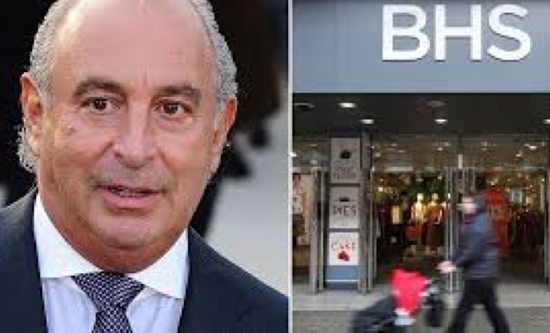
Almost a quarter of BHS staff could lose their jobs despite five bidders expressing interest in the high street department store chain since it went into administration in April. After initial fears that BHS would fold at the cost of all 11,000 jobs, interested suitors have come forward with plans to buy the bulk of the company. However, because they are too unprofitable to be saved, about 40 of BHS’s 164 shops have been condemned by administrators to a ‘red list’.(1)
The collapse of the 88-year-old retail chain is mired in the ‘legal corruption’ of its parasitic owners.The family of billionaire Tory donor, Sir Phillip Green and his Arcadia Group, bought BHS in 2000 for £200m and took £423m in dividends from the company in the next four years. Profits started to contract thereafter and it has recorded losses since 2009.(2) Green – the notorious tax dodger once appointed by David Cameron as the government’s ‘efficiency tsar’ – appears to have bled the company dry and starved it of investment. Regardless, talk of how to revive the British high street fails to account for capitalism’s aggressive tendency towards monopolisation, as evidenced once again by the rise of the likes of Amazon and eBay.
BHS is now loaded with £1.3bn in debt, including a £571m deficit in the defined benefit pension fund. No wonder Green flogged the company for £1 in March 2015. Not that he should have been allowed to – the 2004 Pensions Act supposedly holds business owners responsible for pension deficits and states that they cannot simply pass the buck by selling up. Green has now made a panicked if insulting offer of £80m towards the BHS pension scheme, which has been picked up by the Pension Protection Fund, the state-backed pensions safety net.
Green sold BHS to Retail Acquisition, a group with no retail experience and whose owner Dominic Chappell has twice been declared bankrupt. Shortly after the sale Green reportedly sold the freehold of 12 BHS properties back to BHS for £70m. Green also retained a loan charge over certain BHS assets. Chappell says that Green’s refusal to release the loan charge was the reason BHS failed to secure a £60m loan lifeline from a private equity company, effectively forcing the company into administration. Chappell has hardly raised the lowest of bars, though. In his short time in charge, he sold BHS’s main distribution centre for £15m and paid a third of the proceeds into the parent company to pay off a loan he had used to buy the company in the first place.
Two committees of MPs and the Insolvency Service have launched investigations, meaning Green and Chappell face a supposed ‘grilling’ in parliament. The committees are merely concerned with making sure the state does not bear the brunt of the financial fallout. Labour MP Frank Field, chairman of the Work and Pensions Committee, said the pension deficit had put a ‘potentially significant’ burden on the taxpayer. Field also called for Sir Philip’s knighthood to be removed if the retail tycoon refuses to repay all £571m – a gesture that would be scant consolation for workers facing diminishing pay and conditions or even unemployment at the hands of the universally parasitic capitalist class.




